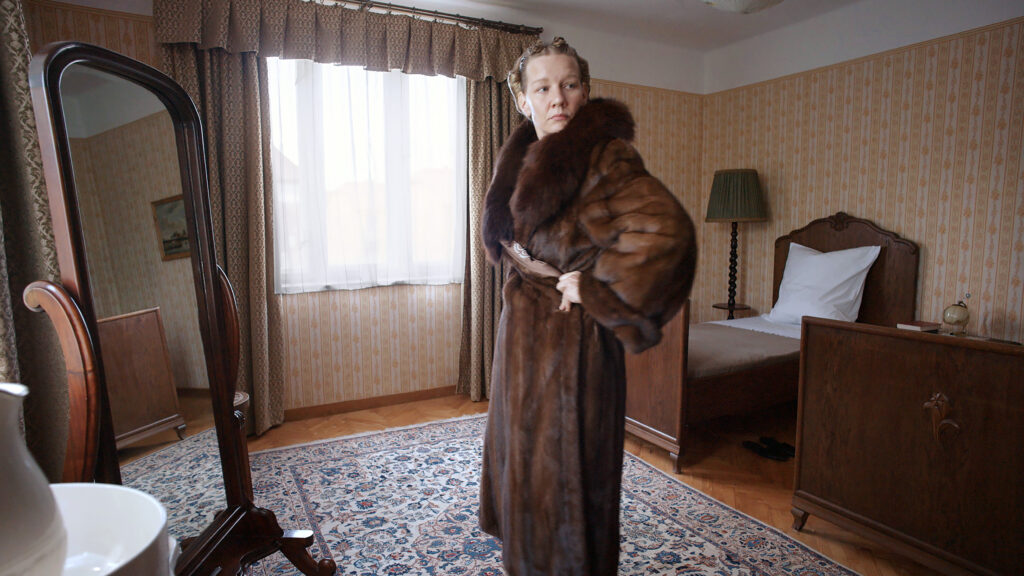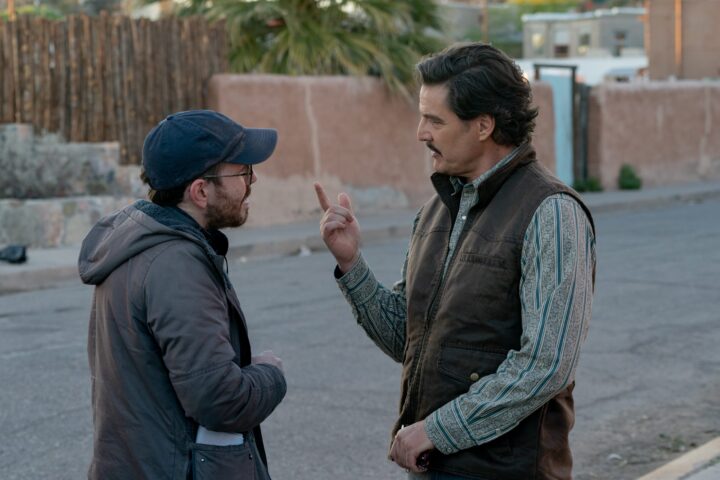Jonathan Glazer’s The Zone of Interest is an austere exercise with a single idea—that evil deeds can be compartmentalized while their perpetrators lead otherwise innocuously guilt-free lives—stretched out for 106 minutes. Deploying a theme applicable to many of history’s villains, Glazer’s glacial treatise on the monster as family man—in this case, Rudolf Höss, the commandant of Auschwitz—is mounted with technical precision but with under glass removal, a less than enlightening examination of the evil that men do. In a film about detachment, Glazer has made an equally detached film, which makes for an often tedious sit.
In a mesmeric, intriguing performance, German screen star and musician Christian Friedel stars as Höss, who lived with his wife, Hedwig (Sandra Hüller) and their five children directly next to Auschwitz (the camp and its surrounding grounds are the titular “zone of interest”), where as the longest serving commandant he architected nearly 3 million deaths. Despite such murderous tyranny, Rudolf and Hedwig live in relative domestic normalcy, a scenes-from-a-marriage routine of keeping social engagements, throwing birthday parties and otherwise tending to their family, garden and home. Theirs seems a marriage as much about devotion to cultural ideology as each other, Hedwig arguing that ”everything the Führer said about how we should live is exactly how we do.”
Their Höss’ servants are Jewish camp prisoners, whom Hedwig rules over while enjoying furs and jewels from the exterminated prisoners. Don’t ask, don’t tell—just accept the horrifying perks of her husband’s job and sleep well each night. Friedel is impressively imposing in an intriguingly low-key fashion. His Höss never allows his blood to boil, never breaks a sweat and even while discussing the design and productivity of gas chambers with his SS comrades at the family dining table, never acknowledges even so much as a hint of their inhumanity (in real life, Höss, executed at Auschwitz post-war for his crimes, claimed he was “following orders” but prior to his demise issued an admission of shame for his barbarism). In perhaps the film’s best moment, Glazer offers a potential physiological side effect to Höss’ measured containment, as if to suggest that such ongoing self-delusions are untenable.

Working with the remarkable cinematographer Łukasz Żal (Ida, Cold War), Glazer crafts a succession of meticulous images, frequently presenting long shot tableaus of “normal” family activities—frolicking in nature, swimming in a river, tending to a flower garden (dusted by the camp’s ashes)—and a variety of eerily effective juxtapositions, including a stunning shot where the viewer, at a high angle, witnesses a Höss child’s birthday party playing out on the family lawn while just over the concrete wall separating their back yard from Auschwitz a smoke puffing train of prisoners pulls into the camp. Pay close attention to the sound design in this scene and what echoes over that wall and is effectively tuned out. In another, a cigar becomes a smokestack. While the film never enters the camp itself, there are a handful of night sequences appearing as if shot in night vision, or a projected film negative in which a young girl sneaks inside (in reality, she was a Polish lass bringing food to prisoners), one taking place while Höss reads Hansel & Gretel to his children. And in the film’s final sequence there is an effective, visual colligation of past and present. Throughout, Mica Levi’s haunting score is as unsettling as any events onscreen.
Glazer’s dispassionate approach to the material may serve his central theme—that people do terrible things and inexplicably deny or rationalize—but after awhile, it becomes clear that slavish adherence to this premise is not going to bring us closer to either Rudolf or Hedwig, and perhaps that is the point. At no moment is Glazer asking the viewer to identify or empathize with the high ranking Nazi and his enabling family, nor should he be, but the irony of placing them front and center in the film while keeping the movie ice cold is antithetical to audience engagement, at least in the traditional sense. It also prevents the screenplay, adapted by Glazer from British author Martin Amis’ 2014 novel of the same title, from truly probing the concept of how criminals are able to rationalize to themselves why they do what they do. Glazer seems uninterested in investigating why (which might have been a more engaging film) and content in merely showing its matter-of-factness, which is not revelatory or sufficiently dramatic.
A selective filmmaker unconcerned with quantitative output, Glazer, whose terrific 2000 gangster-heist picture Sexy Beast gave Ben Kingsley a most memorable role, followed with the haunting 2004 Nicole Kidman-Anne Heche love and death mystery Birth. In 2013 he took an abstract detour in the lauded 2013 sci-fi tale Under the Skin, starring Scarlett Johansson as a comely alien of erotic doom, which despite a modicum of vision was a repetitive conceptual schematic. The Zone of Interest is a similarly diagrammatic experience, not without merit but at a thematic level too single-minded to breathe, or sustain its characters or our interest. Instead of an insightful film on evil he has made an obvious one, however artful.
The banality of evil has, and always will, exist. This much we already knew. Why it does is another matter that deserves its own film.
2 stars



